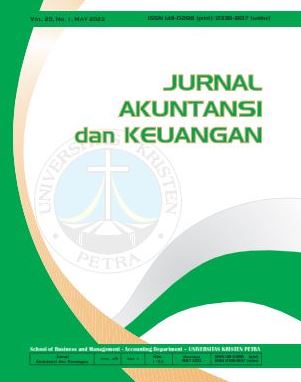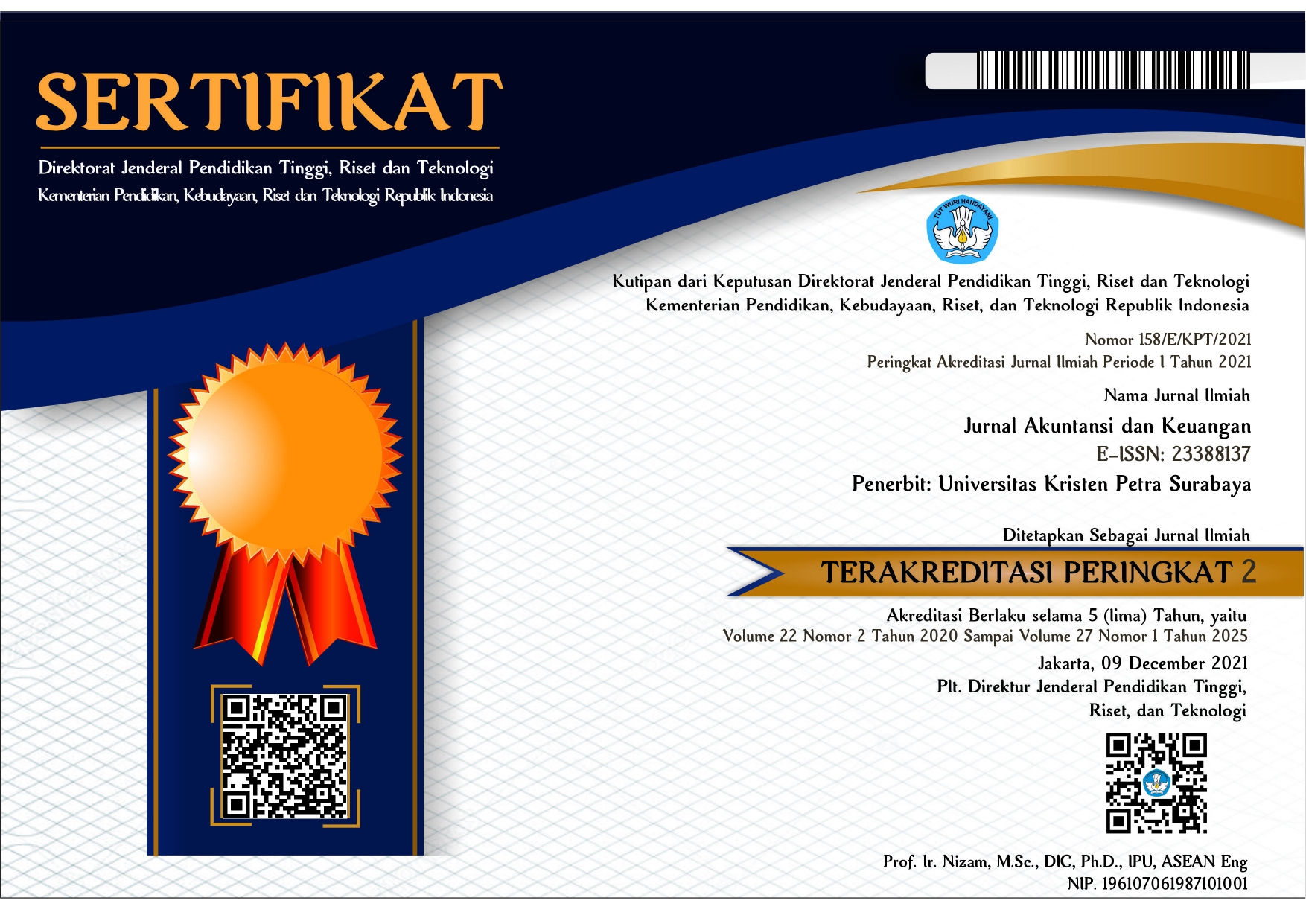The Role of Leadership Function as A Mediating Variable Between Leadership Behaviour and Organizational Performance
DOI:
https://doi.org/10.9744/jak.25.2.79-90Keywords:
Leadership behaviour, leadership function, organizational performance.Abstract
This study examined the relationship between leadership behaviour and organizational performance and the relationship between leadership behaviour and leadership functions. It also analyzed the relationship between leadership functions and organizational performance and the relationship between leadership behaviour and organizational performance using leadership functions as mediating variables. The research data was obtained from 282 state apparatus staff from Surabaya's 62 Regional Working Unit Organizations. The results of this study identified a positive relationship between leadership behaviour and organizational performance, as well as demonstrated that leadership functions can partially mediate the relationship between leadership behaviour and organizational performance. This research is expected to provide insight to leaders in the Regional Working Unit Organization on the importance of good behaviour and leadership functions in leading the organization to achieve better performance.
References
Adelina, F. (2019). Bentuk-bentuk Korupsi Politik. Jurnal Legislasi Indonesia, 16(1), 59–75. https://doi.org/10.1017/CBO9781107415324.004
Ahmad, M. G., & Loch, C. (2019). What Do the Followers Want? The Core Functions of Leadership. Leadership Quarterly, 31(2), 1–23. https://doi.org/10.1016/j.leaqua.2019.04.003
Akbulut, M., Nevra Seggie, F., & Börkan, B. (2015). Faculty Member Perceptions of Department Head Leadership Effectiveness at a State University in Turkey. International Journal of Leadership in Education, 18(4), 440–463. https://doi.org/10.1080/13603124.2014.997799
Amabile, T. M., Conti, R., Coon, H., Lazenby, J., & Herron, M. (1996). Assessing the Work Environment for Creativity. Academy of Management Journal, 39(5), 1154–1184.
Andayani, I., & Tirtayasa, S. (2019). Pengaruh Kepemimpinan, Budaya Organisasi, dan Motivasi terhadap Kinerja Pegawai. Jurnal Ilmiah Magister Manajemen, 2(1), 45–54. https://doi.org/10.29259/jmbs.v16i3.7381
Ashikali, T., & Groeneveld, S. (2015). Diversity Management for All? An Empirical Analysis of Diversity Management Outcomes Across Groups. Personnel Review, 44(5), 757–780. https://doi.org/10.1108/PR-10-2014-0216
Bates, C. (2016). A Methodology Study of Hersey and Blanchard Situational Leadership Theory. Int J Adv Eng Technol Manage Appl Sci, 3(11), 42–48.
Berson, Y., Halevy, N., Shamir, B., & Erez, M. (2015). Leading from Different Psychological Distances: A Construal-level Perspective on Vision Communication, Goal Setting, and Follower Motivation. The Leadership Quarterly, 26(2), 143–155.
Birasnav, M. (2014). Knowledge Management and Organizational Performance in the Service Industry: The Role of Transformational Leader-ship Beyond the Effects of Transactional Leadership. Journal of Business Research, 67(8), 1622–1629.
Boehm, S. A., Dwertmann, D. J. G., Bruch, H., & Shamir, B. (2015). The Missing Link? Inves¬tigating Organizational Identity Strength and Transformational Leadership Climate as Mechanisms that Connect CEO Charisma with Firm Performance. The Leadership Quarterly, 26(2), 156–171.
Bond-Barnard, T. J., Fletcher, L., & Steyn, H. (2018). Linking Trust and Collaboration in Project Teams to Project Management Success. International Journal of Managing Projects in Business, 11(2), 432–457. https://doi.org/10.1108/IJMPB-06-2017-0068
Busono, G. A. (2016). Pengaruh Sistem Pelatihan dan Pengembangan Karyawan terhadap Kinerja Karyawan PT. Persada Sawit Mas (PSM). Muqtashid, I(01), 90–91.
Campbell, J. W. (2016). A Collaboration-Based Model of Work Motivation and Role Ambiguity in Public Organizations. Public Performance & Management Review, 39(3), 655–675. https://doi.org/10.1080/15309576.2015.1137763
Canterino, F., Cirella, S., Piccoli, B., & Shani, A. B. (Rami. (2020). Leadership and change mobilization: The mediating role of distributed leadership. Journal of Business Research, 108 (September 2019), 42–51. https://doi.org/10.1016/j.jbusres.2019.09.052
Dong, Y., Bantol, K. M., Zhang, Z., & Li, C. (2016). Enhancing Employee Creativity via Individual Skill Development and Team Knowledge Sharing: Influences of Dual-focused Transformational Leadership. Journal of Organizational Behavior, 38(3), 439–458. https://doi.org/10.1002/job
Espedal, B., Kvitastein, O., & Grønhaug, K. (2011). When Cooperation is the Norm of Appropriateness: How Does CEO Cooperative Behaviour Affect Organizational Performance? British Journal of Management, 23(2), 257–271. https://doi.org/10.1111/j.1467-8551.2011.00737.x
Fazira, Y., & Mirani, R. (2019). Pengaruh Kepemimpinan terhadap Kinerja Pegawawi pada Dinas Perpustakaan dan Kearsipan Kota Dumai. Jurnal Manajemen, Kepemimpinan, Dan Supervisi Pendidikan, 4(1).
Fiedler, F. E. (1967). A Theory of Leadership Effectiveness. McGraw-Hill. https://books.google.co.id/books?id=Gs5EAAAAIAAJ
Fitri, S. M., Ludigdo, U., & Djamhuri, A. (2014). Pengaruh Gaya Kepemimpinan, Komitmen Organisasi, Kualitas Sumber Daya, Reward, dan Punishment terhadap Anggaran Berbasis Kinerja (Studi Empirik pada Pemerintah Kabupaten Lombok Barat). Jurnal Dinamika Akuntansi, 5(2), 157–171. https://doi.org/10.15294/jda.v5i2.2996
Foster, R., Dodd, M., Brown, L., Awonaya, K., & McCormack, T. (2021). A Student Pilot for a Feasibility Study of The Theoretical 3S Trial (SPFT3S): Patient Questionnaire And Demographics. Age & Ageing, 50.
Gachingiri, A. (2015). Effect of Leadership Style on Organizational Performance: A Case Study of the United Nations Environment Programme (UNEP), Kenya. International Academic Journal of Innovation, Leadership and Entrepreneurship, 1(5), 19–36. www.iajournals.org
Hajar, S., Lubis, A. R., & Lubis, P. H. (2018). Pengaruh Perilaku Kepemimpinan dan Kepercayaan terhadap Kinerja Dinas Sosial Tenaga Kerja dan Transmigrasi Kabupaten Aceh Barat. Jurnal Magister Manajemen, Vol 2(1), 46–57.
Handoko, T. H. (2008). Manajemen Personalia. BPFE Yogyakarta.
Hasibuan, M. S. P. (2016). Manajemen Sumber Daya Manusia. Bumi Aksara.
Hasniasari, R., & Sholihin, M. (2014). Analisis Hubungan Penganggaran Partisipatif dan Kinerja: Pengujian Efek Mediasi Keadilan Persepsian dan Komitmen pada Lembaga Hukum Sektor Publik di Indonesia. Jurnal Akuntansi dan Keuangan, 16(1), 23-32.
Hazy, J. K., & Uhl-Bien, M. (2015). Towards Operationalizing Complexity Leadership: How Generative, Administrative and Community-Building Leadership Practices Enact Organizational Outcomes. Leadership, 11(1), 79–104. https://doi.org/10.1177/1742715013511483
Hsieh, J. Y., & Liou, K. T. (2018). Collaborative Leadership and Organizational Performance: Assessing the Structural Relation in a Public Service Agency. Review of Public Personnel Administration, 38(1), 83–109.
Huertas-Valdivia, I., González-Torres, T., & Nájera-Sánchez, J. J. (2022). Contemporary leadership in hospitality: a review and research agenda. International Journal of Contem¬porary Hospitality Management, (ahead-of-print).
Jong, J. (2016). The Role of Performance Feedback and Job Autonomy in Mitigating the Negative Effect of Role Ambiguity on Employee Satisfaction. Public Performance & Management Review, 39(4), 814–834. https://doi.org/10.1080/15309576.2015.1137771
Kalangi, R. (2015). Pengembangan Sumber Daya Manusia dan Kinerja Aparat Sipil Negara di Kabupaten Kepulauan Sangihe Provinsi Sulawesi Utara. Jurnal LPPM Bidang EkoSosBudKum, 2(1), 1–18.
Lee, H. W. (2018). Linking Leadership Practices to Performance of the U.S. Federal Agencies: Mediating Roles of Generic Leadership Functions. International Journal of Manpower, 39(3), 1–64. https://doi.org/10.1108/01437720199400001
Liu, Y., & Watson, S. (2020). Whose Leadership Role is More Substantial for Teacher Professional Collaboration, Job Satisfaction and Organizational Commitment: A Lens of Distributed Leadership. International Journal of Leadership in Education, 00(00), 1–29. https://doi.org/10.1080/13603124.2020.1820580
Manik, E., & Coenraad, D. P. (2015). Pengaruh Fungsi Kepemimpinan, Kompetensi, dan Budaya Organisasi terhadap Kinerja Pegawai pada Direktorat Jenderal Energi Baru, Terbarukan dan Konservasi Energi (DJEBTKE). Jurnal Ekonomi, Bisnis & Entrepreneurship, 9(1), hlm.56-67.
Masih Khokhar, A., & Zia-ur-Rehman, M. (2017). Linking Ethical Leadership to Employees’ Performance: Mediating Role of Organizational Citizenship Behavior and Counterproductive Work Behavior. Pakistan Journal of Commerce and Social Sciences, 11(1), 321–350.
Mattareli, E., Cochis, C., Bertolotti, F., & Ungureanu, P. (2022). How Designed Work Environment and Enacted Work Interactions IMpact Creativity and Work-Life Balance. European Journal of Innovation Management, Vol. ahead-of-print, No. ahead-of-print. https://doi.org/10.1108/EJIM-01-2022-0028.
Muizu, W. O. Z., Kaltum, U., & Sule, E. T. (2019). Pengaruh Kepemimpinan terhadap Kinerja Karyawan. Jurnal Pendidikan Kewirausahaan Indonesia (PERWIRA), 2(1), 42–50. https://doi.org/10.31328/bmb.v1i2.100
Narsa, N. P. D. R. H. (2018). Inovasi Pelayanan: Telaah Literatur Perbandingan Sektor Privat dan Sektor Publik. Berkala Akuntansi Dan Keuangan Indonesia, 3(2), 46-62.
Notanubun, Z. (2018). Analisis Pengaruh Kinerja Pegawai dan Efektivitas Kepemimpinan terhadap Kinerja Organisasi pada Dinas Pendidikan Provinsi Maluku. Jurnal Bimbingan Dan Konseling Terapan, 03(02), 12–18.
Patras, Y. E. (2017). Pengaruh Perilaku Kepemimpinan, Keadilan Organisasi dan Keterlibatan Kerja terhadap Organizational Citizenzhip Behavior Dosen. Pedagonal : Jurnal Ilmiah Pendidikan, 1(1), 8–14. https://doi.org/10.33751/pedagog.v1i1.221
Peralta, C. F., Lopes, P. N., Gilson, L. L., Lourenço, P. R., & Pais, L. (2015). Innovation Processes and Team Effectiveness: The Role of Goal Clarity and Commitment, and Team Affective Tone. Journal of Occupational and Organizational Psychology, 88(1), 80–107. https://doi.org/10.1111/joop.12079
Pundt, A. (2015). The Relationship Between Humorous Leadership and Innovative Beha¬vior. Journal of Managerial Psychology, 30(8), 878–893. https://doi.org/10.1108/JMP-03-2013-0082
Redmond, M. R., Mumford, M. D., & Teach, R. (1993). Putting Creativity to Work: Effects of Leader Behavior on Subordinate Creativity. Organizational Behavior and Human Decision Processes, 55(1), 120–151.
Rorong, N. N., & Lasdi, L. (2020). The Effect of Organizational Culture and Good Corporate Governance Mechanism on Human Resource Disclosure. Jurnal Akuntansi dan Keuangan, 22(2), 72-81. https://doi.org/10.9744/jak.22.2. 62-71.
Roy, A. Kumar. (2020). A Comprehensive Guide for Design, Collection, Analysis and Presentation of Likert and Other Rating Scale Data (Analysis of Likert Scale Data).
Ruiz-Jiménez, J. M., & Fuentes-Fuentes, M. del M. (2015). Management Capabilities, Innovation, and Gender Diversity in the Top Management Team: An Empirical Analysis in Technology-based SMEs. BRQ Business Rese¬arch Quarterly, 19(2), 107–121. https://doi.org/10.1016/j.brq.2015.08.003
Samimi, M., Cortes, A. F., Anderson, M. H., & Herrmann, P. (2022). What is strategic leadership? Developing a framework for future research. The Leadership Quarterly, 33(3), 101353.
Sande, J. B., & Ghosh, M. (2018). Endogeneity in Survey Research. International Journal of Research in Marketing, 35(2), 185–204.
Santos, J. P., Caetano, A., & Tavares, S. M. (2015). Is Training Leaders in Functional Leadership a Useful Tool for Improving the Performance of Leadership Functions and Team Effectiveness? Leadership Quarterly, 26(3), 470–484. https://doi.org/10.1016/j.leaqua.2015.02.010
Sayadi, S., Nazari, M., & Mashali, S. E. (2016). The Elaboration of the Transformational Leadership Effect on Organizational Performance through Innovation and Organizational Learning (Case Study: Khuzestan Cement Company). International Business Management, 10(15), 2860–2873.
Shaleh, M., & Firman, S. P. (2018). Komitmen Organisasi terhadap Kinerja Pegawai. Penerbit Aksara Timur.
Shin, Y., Sung, S. Y., Choi, J. N., & Kim, M. S. (2015). Top Management Ethical Leadership and Firm Performance: Mediating Role of Ethical and Procedural Justice Climate. Journal of Business Ethics, 129(1), 43–57.
Stoner, J. A. F., & Freeman, R. E. (1992). Management (5th Editio). Prentice Hall. https://books.google.co.id/books?id=m5RYQwAACAAJ
Suryadi, E. (2010). Analisis Peranan Leadership dan Budaya Organisasi terhadap Kinerja Pegawai. Managerial, 8, 1–9.
Venkatesh, R. and Blaskovich, J. (2012). "The mediating effect of psychological capital on the budget participation-job performance relation-ship", Journal of Management Accounting Research, 24(1), 159–175
Vermeeren, B., Kuipers, B., & Steijn, B. (2014). Does Leadership Style Make a Difference? Linking HRM, Job Satisfaction, and Organizational Performance. Review of Public Personnel Administration, 34(2), 174–195.
Vroom, V. H., & Jago, A. G. (2007). The Role of the Situation in Leadership. American Psychologist, 62(1), 17–24.
Wang, H., Tsui, A. S., & Xin, K. R. (2011). CEO leadership behaviours, organizational performance, and employees' attitudes. The Leadership Quarterly, 22(1), 92–105.
Yang, L.-R., Huang, C.-F., & Hsu, T.-J. (2014). Knowledge Leadership to Improve Project and Organizational Performance. International Journal of Project Management, 32(1), 40–53.
Yousef, D. A. (2012). Organizational Commitment: A Mediator of the Relationships of Leadership Behavior with Job Satisfaction and Performance in a Non-Western Country. Journal of Managerial Psychology, 15(1), 6–24. https://doi.org/10.1108/02683940010305270.
Zhang, M. J., Zhang, Y., & Law, K. S. (2022). Paradoxical Leadership and Innovation in Work Teams: The Multilevel Mediating Role of Ambidexterity and Leader Vision as a Boundary Condition. Academy of Management Journal, 65(5), 1652-1679.
Downloads
Published
How to Cite
Issue
Section
License
Authors who publish with this journal agree to the following terms:
- Authors retain the copyright and publishing right, and grant the journal right of first publication with the work simultaneously licensed under a Creative Commons Attribution License that allows others to share the work with an acknowledgement of the work's authorship and initial publication in this journal.
- Authors are able to enter into separate, additional contractual arrangements for the non-exclusive distribution of the journal's published version of the work (e.g., post it to an institutional repository or publish it in a book), with an acknowledgement of its initial publication in this journal.
- Authors are permitted and encouraged to post their work online (e.g., in institutional repositories or on their website) followingthe publication of the article, as it can lead to productive exchanges, as well as earlier and greater citation of published work (See The Effect of Open Access).<a href="http://creativecommons.org/lice















